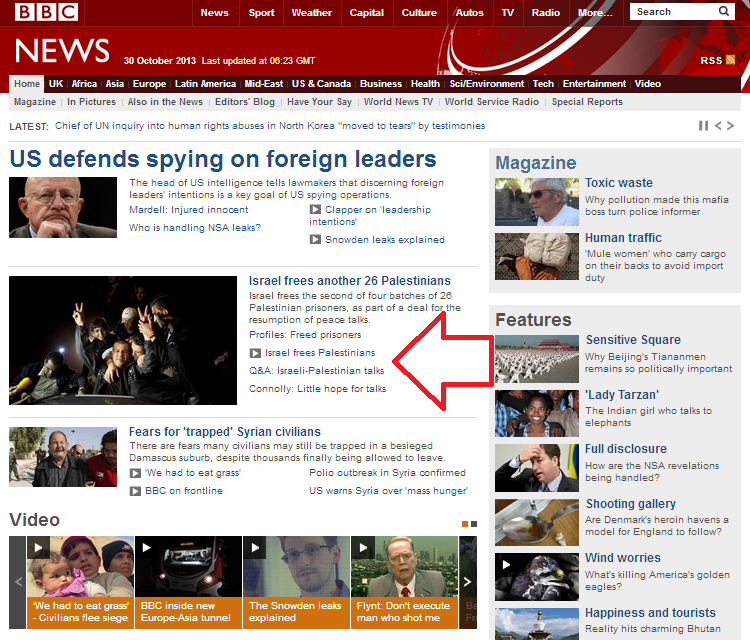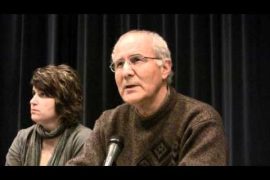The first episode in Jeremy Bowen’s new BBC Radio 4 series of programmes about the Middle East was aired on May 15th.
The programme – titled “The Giant Awakens” – is ostensibly about the build-up to the First Gulf War in 1991. However, around a third of the episode is actually devoted to other topics and a transcript of most of that section of the programme was also uploaded to the programme’s webpage under the title “The three most significant foreign interventions in the Middle East“.
Bowen tells Radio 4 listeners and website visitors that: [emphasis in bold added, emphasis in italics in the original]
“Big powers have intervened in the Middle East to reshape it to their requirements since ancient times.
It’s strategically placed, connecting Europe with Asia and Africa. It’s the home of the world’s three great monotheistic religions. And for the last 100 years or so, great powers have needed its oil reserves – the biggest in the world.
Two imperial grandees created – and some say cursed – the modern Middle East when they carved up the Ottoman Empire at the height of the First World War. One was a French diplomat, Charles Francois Georges Picot; the other, Sir Mark Sykes, was British.
The Sykes-Picot agreement was designed to win the peace for Britain and France. It defined zones of influence in the Middle East for the two imperial powers. Borders of new states came later.
But to win the war, the British had already made promises to the Arabs.
The Sharif of Mecca, Hussein Ibn Ali, led an Arab revolt against the Ottoman Turks. In return, he believed the British had promised him an independent Arab kingdom across much of present day Saudi Arabia, Syria, Iraq, Jordan, Lebanon, Israel and the Palestinian territories.
Hussein kept his word. The duplicitous British did not.
The requirements of Empire came first. The promise of Arab self-determination was part of the collateral damage.”
Bowen is of course referring to the Hussein-McMahon correspondence. However, as has been previously noted here on several occasions, Sir Henry McMahon himself pointed out in a letter to the Times in 1937 that the claim that Hussein was promised all of the territory described by Bowen is incorrect.
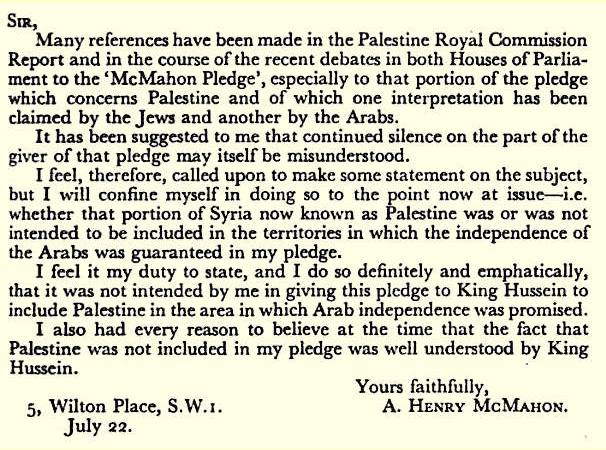
That point had earlier been clarified in the British government’s White Paper of 1922.
“With reference to the Constitution which it is now intended to establish in Palestine, the draft of which has already been published, it is desirable to make certain points clear. In the first place, it is not the case, as has been represented by the Arab Delegation, that during the war His Majesty’s Government gave an undertaking that an independent national government should be at once established in Palestine. This representation mainly rests upon a letter dated the 24th October, 1915, from Sir Henry McMahon, then His Majesty’s High Commissioner in Egypt, to the Sharif of Mecca, now King Hussein of the Kingdom of the Hejaz. That letter is quoted as conveying the promise to the Sherif of Mecca to recognise and support the independence of the Arabs within the territories proposed by him. But this promise was given subject to a reservation made in the same letter, which excluded from its scope, among other territories, the portions of Syria lying to the west of the District of Damascus. This reservation has always been regarded by His Majesty’s Government as covering the vilayet of Beirut and the independent Sanjak of Jerusalem. The whole of Palestine west of the Jordan was thus excluded from Sir Henry McMahon’s pledge.” [emphasis added]
Nevertheless, the BBC – and the man whose job it is to “make a complex story more comprehensive or comprehensible for the audience” – continues to promote that politically motivated myth.
Bowen continues:
“Within 20 years, a Palestinian scholar called Sykes-Picot a shocking document – the product of greed, stupidity and double-dealing.”
That “Palestinian scholar” was George Antonius and he was actually born in 1891 in Lebanon to an Eastern Orthodox Christian family. Having graduated from Cambridge, Antonius became a civil servant in the British Mandate administration in Palestine. The phrase quoted by Bowen appears in Antonius’ 1938 book ‘The Arab Awakening’ and it was refuted by Efraim Karsh in his book ‘Rethinking the Middle East’ (from page 58).
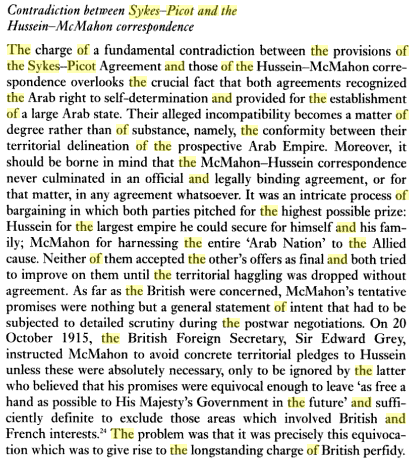
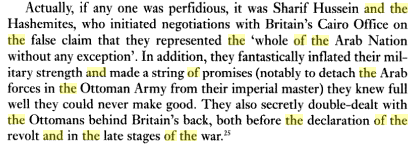
Bowen continues:
“Another vision of the future cut across Hussein Ibn Ali’s hopes: Zionists lobbied Britain, successfully, to support the idea of a Jewish state in Palestine.
In November 1917, Britain’s foreign secretary Arthur Balfour declared that Britain would “view with favour the establishment of a national home for the Jewish people”. Britain also promised “that nothing shall be done which may prejudice the civil and religious rights of existing non-Jewish communities in Palestine.”
Making promises to both sides built a deadly contradiction into the Balfour Declaration. By the early 1920s, Arabs and Jews in Palestine were killing each other. They are responsible for what they’ve done. But Britain started the fire.
For Palestinians the Balfour Declaration was a milestone on the road to catastrophe. For Israelis it led to statehood.
A century on it’s still politically resonant – triumphant or toxic, depending on your view of history.”
Bowen’s promotion of the notion that the Balfour Declaration includes “a deadly contradiction” is of course the product of his own chosen political narrative. Notably, he fails to inform BBC audiences that the principle expressed in the Balfour Declaration was given the unanimous stamp of approval by the League of Nations in 1922 and that in the same year, 77% of the territory originally designated to the Jewish homeland was given over to the Hashemites when Transjordan was created.
In the audio version listeners next hear Bowen say:
“Earlier this year Britain’s Foreign Secretary, Boris Johnson, showed Israel’s Prime Minister Benjamin Netanyahu round his grand corner office overlooking St James’ Park.”
A recording of the British Foreign Secretary showing Arthur Balfour’s desk is then heard before the report goes on:
“The deals made in World War One were designed to strengthen the British and French empires. The Ottoman Empire was breaking up after nearly 500 years and the European imperial powers were creating a new order in the Middle East.”
Jeremy Bowen’s presentation of this topic is far from accurate and impartial and it is clearly motivated by the political narrative he has chosen to adopt and advertise. Unfortunately, there is nothing new about that: the politicised misrepresentation of this subject by the gatekeeper of the BBC’s Middle East content goes back many years. However, that misrepresentation is all the more egregious at a time when political campaigns concerning the Balfour Declaration are in the news.
Related Articles:
BBC Radio 4 launches a new ME series by Jeremy Bowen
Reviewing BBC portrayal of the Balfour Declaration
The BBC and the myth of the ‘twice promised land’
Resources:


